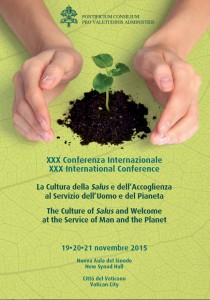XXX International Conference
of the Pontifical Council for Health Care Workers (for Health Pastoral Care)
Vatican City,
19-21 November 2015
Presentation
 The identification of strategies and the establishment of specific objectives in order to serve the Person, ‘sora nostra matre terra’1 (‘our sister mother earth’) and the whole of the Creation in a better way through care for Salus and a renewed impetus in welcoming
The identification of strategies and the establishment of specific objectives in order to serve the Person, ‘sora nostra matre terra’1 (‘our sister mother earth’) and the whole of the Creation in a better way through care for Salus and a renewed impetus in welcoming
‘the other’: such are the goals of the international conference of the Pontifical Council for Health Care Workers (for Health Pastoral Care) which will take place in the customary New Hall of the Synod (Vatican City) on 19-21 November 2015. Centred around the recent Encyclical of Pope Francis, Laudato si’, these three days of activity will have as their subject ‘The Culture of Salus and Welcome at the Service of Man and the Planet’
This thirtieth edition of our international conference will be held a few days before the opening of the Extraordinary Jubilee of Mercy which is dedicated specifically to the virtue which contemplates, amongst its highest expressions, specifically ‘bending down’ to- wards the sick person in order to comfort him or her, to alleviate his or her suffering, and, if possible, to heal him or her. This is a Diakonia of Charity which has in the gospel figure of the Good Samaritan an icon that is always of contemporary relevance, and in the health-care worker who lives his or her work as mission, a privileged actuation of baptism.
Experts at an international level from the five continents of the world, both Catholics and otherwise, will make their contribution to the 2015 edition of our international conference. Their papers will allow an interdisciplinary and intercultural approach to the ecological problems highlighted in the encyclical, above all in re- lation to the problems connected with health, both for individuals and for societies and nations, not only in the most economically and technologically developed countries of the world but also, and above all else, as regards the most disadvantaged peoples and parts of populations.
With Laudato si’ as a key by which to understand things, within the framework of the deliberations the intention is to emphasise the value of the life and the dignity of the human person, re-exa- mining the Magisterium of the Church of St. John Paul II, the author of the encyclical Evangelium Vitae, the twentieth anniversary of whose publication is celebrated, and the theology of life of Pope Benedict XVI.
This year, as well, the international conference will be inau- gurated by a Holy Mass at the altar of the chair of St. Peter, this time presided over by His Eminence Cardinal Peter Kodwo Appiah Turkson, the President of the Pontifical Council for Justice and Peace
Later in the morning, the Holy Father Francis will receive all the participants at an audience. This meeting with Pope Francis, a key moment, will certainly give to everyone a greater impetus in their commitment to serving the person and the environment. It will also amount to a strengthening of that invitation, which the international conference also intends to relaunch, to change, to perfect or at least to improve the lifestyles of all of us in order to be able to work effectively in favour of the centrality of the human being, respecting the Creation: an appeal to commit ourselves to the utmost to replace the ‘discard culture’ with the ‘culture of care’.
In wishing a cordial ‘good work’ to everyone, I wish to entrust this international conference to the intercession of the Virgin Mary and St. Joseph. May our Mother and ‘Queen of all of creation…enable us to look at this world with eyes of wisdom’!2 and may St. Joseph, the Custodian of the Holy Family of Nazareth and the Universal Church, teach us ‘to work with generosity and tenderness in protecting this world which God has entrusted to us’,3 placing ourselves in this way at the service of the unique human family itself.
Mons. Zygmunt Zimowski President of the Pontifical Council for Health Care Workers














Camillians on Facebook
Camillians on Twitter
Camillians on Instagram